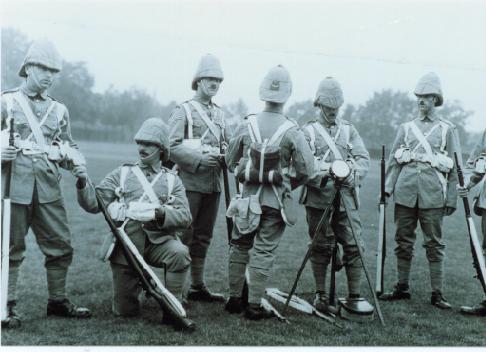 gloucesters
gloucestersTowards the end of October Sir George White decided that something must be done to protect his line of communication with the south. The Boers were spreading out in crescent form and drawing gradually nearer to the town. On the north were troops commanded by General Joubert.
 foundry
foundryOn the west was a Free State commando, and on the east was General Lucas Meyer, who owed us a grudge after the events of Talana Hill. Reinforced by troops from General Erasmus, he now desired to press towards the railway with a view to seizing it at some point south of the town. It was necessary at all costs to put a stop to this scheme. Colonel Ian Hamilton with an Infantry Brigade was therefore despatched on the 27th to Lombard's Kop, a hill some five miles east of Ladysmith.
 There he bivouacked for the night, with a view to clearing the enemy out at the point of the bayonet on the morrow. He never brought his plan into execution, however, for Sir George White, having been informed of the size of Meyer's force, ordered him to fall back on the town. On Sunday the 29th it was discovered that the Boers were intrenched in lines that extended over twenty miles, while "Long Tom," their six-inch gun, was perched on Pepworth Hill, its big ominous muzzle being situated some 7500 yards to the north of Ladysmith.
There he bivouacked for the night, with a view to clearing the enemy out at the point of the bayonet on the morrow. He never brought his plan into execution, however, for Sir George White, having been informed of the size of Meyer's force, ordered him to fall back on the town. On Sunday the 29th it was discovered that the Boers were intrenched in lines that extended over twenty miles, while "Long Tom," their six-inch gun, was perched on Pepworth Hill, its big ominous muzzle being situated some 7500 yards to the north of Ladysmith. In addition to this formidable weapon, field-guns with a range of some 8000 yards were posted about in well-concealed positions. For the protection of our line of communication it was necessary that the enemy, though three times as strong as the British force, should be dispersed, and that night, at half-past ten o'clock, Colonel Hamilton again set out with three battalions, the Devons, the Gordons, the Manchesters, and a Brigade Division of Artillery.
In addition to this formidable weapon, field-guns with a range of some 8000 yards were posted about in well-concealed positions. For the protection of our line of communication it was necessary that the enemy, though three times as strong as the British force, should be dispersed, and that night, at half-past ten o'clock, Colonel Hamilton again set out with three battalions, the Devons, the Gordons, the Manchesters, and a Brigade Division of Artillery. 
long tom pass
The night was dark but clear, and the troops marched along the Newcastle Road to Limit Hill, a strong kopje some three miles north of Ladysmith, and half-way between that town and Pepworth Hill. There they bivouacked for the night. While this party was moving as described, a small force under Colonel Carleton, composed of four and a half companies of the Gloucestershire Regiment and six companies of the Royal Irish Fusiliers and No. 10 Mountain Battery, was moving towards Nicholson's Nek with a view of seizing it. But of Colonel Carleton's column anon.
 the nek
the nekOn the extreme right, when day broke, was General French with a Cavalry Brigade and some volunteers. The idea was, that while Colonel Grimwood was shelling the Boer position to the north of Lombard's Kop, General French should prevent any attempt to turn his right; the enemy's artillery silenced, Colonel Grimwood was to drive him along the ridge running to Pepworth, and, under cover of the British guns, press the Boers towards their centre. Meanwhile our centre, under Colonel Hamilton, was to attack a hill where the enemy was in force, rout him and join in the general scheme, while Colonel Carleton protected the centre from a flank movement.
.jpg) Unfortunately "the best laid schemes o' mice and men gang aft agley," and General White's admirable scheme failed, as we shall learn. An artillery duel began operations, and this continued for two long hours, while the warm spring morning developed, and the Boers, who had been warned of our plans and had changed their position during the night, were laughing in their sleeves at the capital surprise they had prepared. They had drawn off their men from the point that was to have been the objective of our centre,
Unfortunately "the best laid schemes o' mice and men gang aft agley," and General White's admirable scheme failed, as we shall learn. An artillery duel began operations, and this continued for two long hours, while the warm spring morning developed, and the Boers, who had been warned of our plans and had changed their position during the night, were laughing in their sleeves at the capital surprise they had prepared. They had drawn off their men from the point that was to have been the objective of our centre,
No comments:
Post a Comment